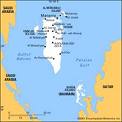 |
| Bahrain - a tiny kingdom comprising an archipelago of low sandy islands in the Persian Gulf between Qatar and Saudi Arabia. |
The attack took place after Friday prayers in the Shia village of Duraz, about 15 kilometres west of the capital, Manama, where the US Navy Fifth Fleet is based with some 4,000 personnel.
All three Gulf states are key allies of the US, with Washington supplying each with billions of dollars worth of military equipment. The three autocratic regimes have also been crucial supporters of the US and NATO’s nearly five-month military assault on Libya – allegedly conducted to defend the human rights of the Libyan people.
In the latest outrage against human rights in
Bahrain, the video shows two jeeps racing towards a crowd of young
males, almost running some of them over. Uniformed police then jump out
of the vehicles and start firing shotguns and rubber bullets at the
fleeing protesters. Many in the crowd were obviously young teenagers,
dressed in shorts and barefoot.
Last week, a 47-year-old mother, Zainab Hassan Al Jumaa died from teargas inhalation after police launched a similar attack on the Shia town of Sitra. Several other Shia towns and villages are routinely assailed by armed forces – nearly a month after the so-called end of emergency powers.
The video of the attack in Duraz shows personnel in Bahraini ministry of interior vehicles wearing Bahraini state uniforms. But security sources have confirmed to Global Research that the personnel include troops from Saudi Arabia and the United Arab Emirates. It is an open secret that Saudi and Emirati troops disguise themselves as Bahraini police, which in itself is a transgression of international law.
Last month, Bahraini head of state King Hamad Al Khalifa declared an end of a state of emergency that began in mid-March when thousands of Saudi and Emirati troops entered the Persian Gulf kingdom to suppress a peaceful pro-democracy uprising. During the following months nearly 40 civilians have been killed by pro-state forces, hundreds have been injured, and more than 1,000 arrested and held in detention without charges.
Some 400 people have been brought before martial courts and sentenced to years of imprisonment. Currently, 48 doctors, nurses and paramedics are being prosecuted for “inciting hatred against the rulers” and for breaching medical codes after the medics treated hundreds of protesters who had suffered horrendous state-inflicted injuries.
Up to 2,000 workers have been sacked from their jobs, accused of supporting anti-government rallies. This has caused untold economic hardship and amounts to “collective punishment”.
The vast number of victims of state repression are from the majority Shia community. The Bahraini Sunni elite has enlisted the help of the Wahhabi Saudi state in a blatant campaign of retribution against Bahrain’s Shia majority, which has deliberately stoked sectarian divisions on the Gulf island. As well as countless human rights violations, Saudi forces have been involved in bulldozing dozens of Shia mosques and burial sites
Washington, which repeatedly describes the Bahraini regime as “an important ally”, has tacitly backed the Saudi and Emirati military intervention even though this has resulted in atrocities and crimes against humanity.
In the face of countervailing evidence, President Barack Obama has talked up the Bahraini regime’s declared political talks initiative as a positive development.
However, the latest video showing Saudi and Emirati troops firing on pro-democracy protesters in Bahrain provides a snapshot of clarity about where Washington actually stands on the issue of democratic freedom and human rights. Troops from two of the most autocratic and repressive regimes in the world are very much still assisting the anti-democratic Bahraini rulers by firing on young peaceful demonstrators who are calling for nothing other than their basic human rights. And clearly, the US government is on the side of the oppressors.
Now, what’s that about defending democracy and human rights in Libya?
Finian Cunningham is a Global Research Correspondent based in Belfast. He was expelled from Bahrain for his critical journalism on 18 June 2011.
Global Research